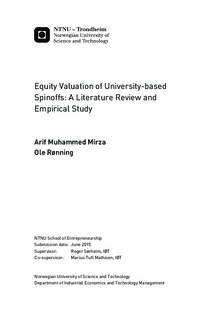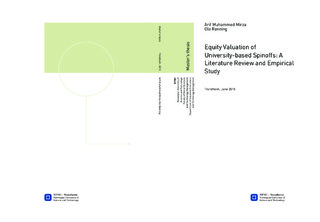| dc.description.abstract | During the last three decades, there has been a significant growth in the establishment of university spin-offs(USOs), and they have become an important part of the economic landscape. These are companies where it is gerally agreed upon that financing is essential in their early stages, yet who face difficulties in raising the necessary capital. This is believed to be due to long development times, and large amounts of uncertainty which makes these companies difficult to value. This master thesis is divided into two articles, where the first examines the applicability of traditional valuation methods on USOs, and the second seeks to investigate the feasibility of a valuation framework based on resource inputs, rather than finacial outputs. Together these two articles aim to lay the foundation on which future research can build to develop better valuation methods, and through this make it easier for investors to assess early stage university spin-offs and close the financing gap these companies face.
Through article 1, the authors investigate, with a basis in a two dimentional theoretical framework based on resource-based theory and risk and uncertainty, how unique resource characteristics in these firms affect the perceived uncertainty seen from the viewpoint of an investor, and subsequently how this uncertainty affects the applicability of traditional valuation methods from corporate finance. It is found that the early-stage, radicalness and significant technical advances of the technologies many of these companies are founded on lead to high fundamental uncertainty, which renders the three most common valuation methods cash flow discounting, balance sheet and income statement unapplicable to early stage USOs. This has important implications for investors, who by blindely using these methods on USOs can make bad investment decisions, or forego valuable investment opportunities.
In light of the findings in article 1, article 2 investigates the feasibility of a resource-based valuation framework, with the underlying argument that when it is difficult to value a company with a basis in financial outputs used in traditional corporate finance, a method based on inputs indentified through theories from strategic management that help predict and explain superior firm performance may prove more satisfactory. Followingly, a conceptual framework with a basis in resource-based theory is developed. To test the framework, six hypotheses about the relationship between initial resource endowments in USOs, and their long term quity value are formuated, and empirically tested through regression on a sample of 63 Norwegian USOs. It is found that, ceteris paribus, higher degrees of heterogeneity in the founding team, better quality parent universites as well as more filed and published patents in the early stages of USO are all positively related to the firms long term equity value. With a basis in this it is argued that USOs who exhibit these resource characteristics in their early stages should be valued higher than those that do not. This has implications for investors, who should take into consideration the particular resources a firm holds when estimating values, and for entrepreneurs who should seek to assemble spesific resources to increase the future value of their firm. Although the development of a complete valuation model was outside of the articles scope, the conceptual valuation framework developed proves that a resource-based valuation framework has potential, and future research efforts should be directed towards this topic. | |

